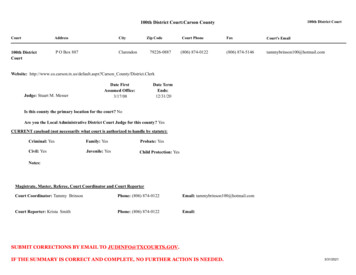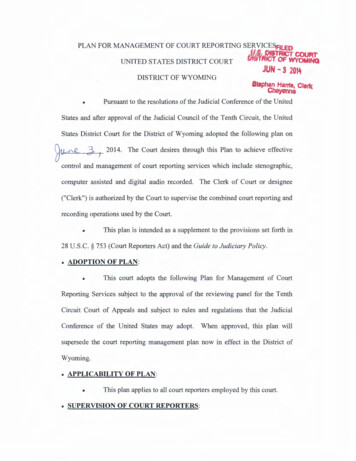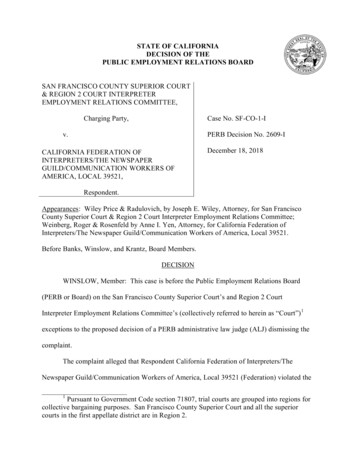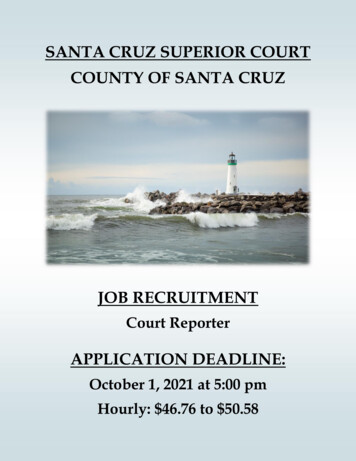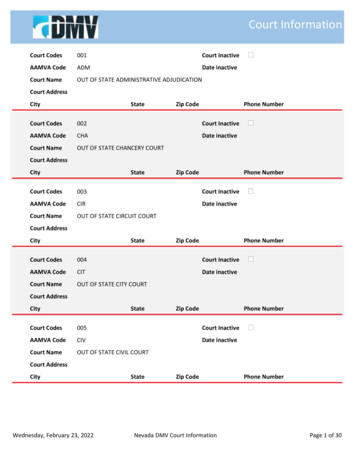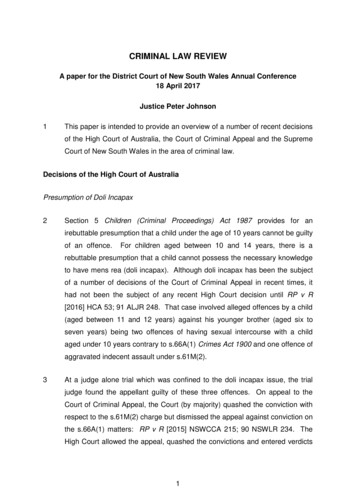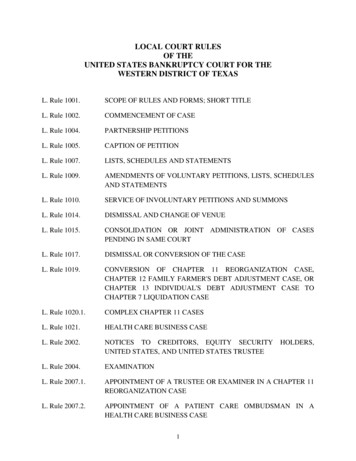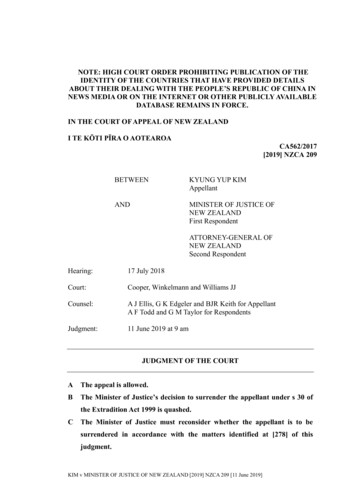
Transcription
NOTE: HIGH COURT ORDER PROHIBITING PUBLICATION OF THEIDENTITY OF THE COUNTRIES THAT HAVE PROVIDED DETAILSABOUT THEIR DEALING WITH THE PEOPLE’S REPUBLIC OF CHINA INNEWS MEDIA OR ON THE INTERNET OR OTHER PUBLICLY AVAILABLEDATABASE REMAINS IN FORCE.IN THE COURT OF APPEAL OF NEW ZEALANDI TE KŌTI PĪRA O AOTEAROACA562/2017[2019] NZCA 209BETWEENKYUNG YUP KIMAppellantANDMINISTER OF JUSTICE OFNEW ZEALANDFirst RespondentATTORNEY-GENERAL OFNEW ZEALANDSecond RespondentHearing:17 July 2018Court:Cooper, Winkelmann and Williams JJCounsel:A J Ellis, G K Edgeler and BJR Keith for AppellantA F Todd and G M Taylor for RespondentsJudgment:11 June 2019 at 9 amJUDGMENT OF THE COURTAThe appeal is allowed.BThe Minister of Justice’s decision to surrender the appellant under s 30 ofthe Extradition Act 1999 is quashed.CThe Minister of Justice must reconsider whether the appellant is to besurrendered in accordance with the matters identified at [278] of thisjudgment.KIM v MINISTER OF JUSTICE OF NEW ZEALAND [2019] NZCA 209 [11 June 2019]
DThe respondents are jointly and severally liable to pay the appellant one setof costs for a standard appeal on a band B basis and usual disbursements.We certify for second counsel.ECosts in the High Court are to be dealt with by that Court having regard tothis judgment.REASONS OF THE COURT(Given by Winkelmann J)Table of ContentsINTRODUCTIONSome necessary context as to the extradition processThe Minister’s role in the extradition processThe surrender decision and the relevance of international law andthe New Zealand Bill of Rights Act 1990International law bearing upon exercise of s 30 discretionNew Zealand Bill of Rights Act and exercise of s 30 discretionPRC’s adoption of international covenantsThe process to extradite Mr KimBriefing to the MinisterMinister’s first decisionFirst judicial reviewMinister’s second decisionSecond judicial reviewGrounds of appealStandard of reviewFIRST GROUND OF APPEALIs reliance upon diplomatic assurances consistent with New Zealand’sinternational obligations?SubmissionsFirst judicial reviewSecond judicial reviewAnalysis(a) Can New Zealand lawfully accept assurances to meet a risk oftorture?(b) Did the Minister err in failing to address a preliminary questionwhether assurances should be accepted in this ][39][42][44][45][48][48][52][56][57][57][71]
SECOND GROUND OF APPEALDid the Minister take into account a consideration irrelevant to hersurrender decision?SubmissionsAnalysis[80]THIRD GROUND OF APPEALDid Minister err in accepting assurances in relation to torture asadequate to protect Mr Kim on return to PRC?SubmissionsEvidence before the Minister in connection with use of torture andextra-judicial killings in the PRCMinister’s first decisionFirst judicial reviewBriefing prior to the second decisionSecond judicial reviewAnalysis(a) Did Minister take into account an irrelevant consideration, namelyrelative risk?(b) Did the Minister err in assessing the magnitude of the risk thatMr Kim would be tortured?(c) Did the Minister err in concluding that other factors reducedMr Kim’s risk?(d) Was the Minister’s conclusion that the assurances were adequate toprotect Mr Kim 117][117][118][121][127]FOURTH GROUND OF APPEALDid the Minister err in relying upon diplomatic assurances as anadequate protection against the imposition of the death penalty?Exposure to death penaltySubmissionsMinister’s first decisionJudicial review decisionsAnalysis[140]FIFTH GROUND OF APPEALDid the Minister fail to address the risk of extra-judicial killing?Relevant backgroundAnalysis[156]SIXTH GROUND OF APPEALDid the Minister apply an incorrect legal standard in determiningwhether Mr Kim’s right to a fair trial would be upheld?Legal frameworkAnalysis[167]SEVENTH GROUND OF APPEALDid the Minister err in concluding that there was no risk of departurefrom fair trial standards justifying refusal of surrender?PRC’s criminal justice ][176][188]
Right to a hearing before an independent and public tribunalRight to legal representationRight not to be compelled to testify or confess guiltConclusion[192][222][244][257]EIGHTH GROUND OF APPEALDid the Minister err in making the decision to surrender Mr Kimnotwithstanding the absence of assurance addressing the risk ofdisproportionate punishment?Relevant backgroundAnalysis[258]NINTH GROUND OF APPEALDid the Minister err in relying on advice from PRC officials as toMr Kim’s access to mental health care in custody in the PRC?[269]SUMMARY OF roduction[1]Mr Kim is a citizen of the Republic of Korea. He came to New Zealand withhis family in 1989, when he was 14 years old. He and his mother are permanentresidents of New Zealand, while his father and younger brother are New Zealandcitizens. Mr Kim is the father of two teenage children, for whom he is the principalcaregiver.[2]Chinese authorities allege that in 2009, Mr Kim killed a 20-year-old womanPei Yun Chen in Shanghai. Chinese police have both forensic and circumstantialevidence linking Mr Kim to the homicide. On 25 May 2011 New Zealand received arequest from the People’s Republic of China (the PRC) seeking the extradition ofMr Kim on one count of intentional homicide. That request included an assurance thatif convicted, Mr Kim would not be sentenced to death.[3]In response to that request, Mr Kim was arrested in New Zealand and held incustody pending completion of extradition proceedings. He remained detained forover five years as the extradition proceedings made their way through the courts before
eventually being released on electronic bail. The proceedings in connection with thisrequest for extradition have a lengthy and complex history, which we need only outlinein part.1 In the ensuing seven years since that initial arrest, Mr Kim has resistedsurrender arguing that he will be at significant risk in the PRC of torture, extra-judicialkilling or the imposition of the death penalty. He says his mental health is such thathe should not be surrendered, and that if he is surrendered, he will receive inadequatetreatment. He claims to have a defence to the charge but says he will not receive afair trial if returned to the PRC because of systemic and fundamental flaws in itscriminal justice system. Finally, Mr Kim argues that if convicted, he will be exposedto a disproportionately severe sentence.[4]The Minister of Justice is responsible under the Extradition Act 1999(the Extradition Act) for the decision to surrender Mr Kim. The Minister sought andreceived various assurances from the PRC to meet the concerns identified by Mr Kimand Ministry officials in connection with the risk of torture and Mr Kim’s right toa fair trial. In late 2015, following receipt of those assurances, the then Minister ofJustice, the Hon Amy Adams, determined that Mr Kim was to be surrendered.She concluded that Mr Kim was at risk of torture if surrendered but that assurancesprovided by the PRC which allowed extensive monitoring of Mr Kim’s treatmentadequately addressed this risk. In assessing the risk the assurances had to meet,the Minister proceeded on the basis that, as an ordinary criminal, Mr Kim was not athigh risk of torture, and that other aspects of his case further reduced the risk. She wassatisfied that recent reforms to criminal procedure, and assurances regarding access toa lawyer, met any risk that Mr Kim would not receive a fair trial on his return.[5]Mr Kim applied successfully to judicially review that decision beforeMallon J.2 The Judge identified reviewable errors and directed the Minister toreconsider her decision.3123CIV-2012-485-1918 (Habeas corpus); CRI-2013-404-000007 (Bail); CIV-2012-485-2506(Judicial review of eligibility for surrender); CIV-2014-404-3107 (Habeas corpus); CIV-2014404-3174 (Habeas corpus); CIV-2015-485-1009 (Bail); CIV-2015-485-1036 (Judicial review ofMinister’s decision); CIV-2016-485-843 (Judicial review of Minister’s second decision).Kim v Minister of Justice [2016] NZHC 1490, [2016] 3 NZLR 425 [First judicial review].At [259]–[262].
[6]The Minister, having reconsidered whether to surrender Mr Kim, againdecided that Mr Kim was to be surrendered. Mr Kim then applied to judicially reviewthe Minister’s second surrender decision, but on this second occasion, Mallon Jrefused the application.4[7]Mr Kim now appeals that refusal of judicial review. He argues that in decliningthe second application for review, the Judge overlooked serious errors in the Minister’sdecision-making process and reasoning. Mr Kim’s overall contention is that indeciding to surrender Mr Kim, the Minister failed to come to grips with the functioningof the PRC’s legal system in which pre-trial torture and extra-judicial execution isendemic, and a fair trial is not possible. He argues the Minister underestimatedthe extent of the risks that Mr Kim faced, due to errors in her decision-making processand because she took a view of the facts not reasonably open to her. He contends thatthe Minister ought not to have relied upon diplomatic assurances because that practiceundermines the standing of international conventions and the rule of law in the PRC,and because the assurances in this case are inadequate to meet the concerns theypurport to address.[8]The issues on this judicial review are difficult. Mr Kim’s case is the firstoccasion on which New Zealand has been asked to extradite to the PRC. Extraditionprocesses exist to ensure that those who commit crimes cannot escape consequencesby fleeing the jurisdiction — that there should be no safe havens for those who commitserious crimes. And it is alleged that Mr Kim has committed a very serious crime,a crime in respect of which credible evidence has been gathered by the PRC. But onthe other hand, the Minister of Justice is asked to return Mr Kim to a country that hasa criminal justice system very different to our own, that has not committed to relevantinternational instruments in the way or to the extent that New Zealand has — a countryin which, it is reliably reported, torture remains widespread (notwithstandingprocedural reforms in the last 40 years which have reduced the incidence of torture)and in which the criminal justice system is subject to political influence. New Zealandhas obligations under international law to refuse to return a person to a jurisdiction in4Kim v Minister of Justice [2017] NZHC 2109, [2017] 3 NZLR 823 at [157] [Second judicialreview].
which they will be at substantial risk of torture, or where they will not receive a fairtrial.[9]It is in this context that the courts are asked to review the Minister’s exerciseof her decision-making power to surrender Mr Kim. On the view we have taken,the Minister must again re-visit the decision to surrender. We have summarised ourreasons at [275] below.Some necessary context as to the extradition processThe Minister’s role in the extradition process[10]There is no extradition treaty in force between New Zealand and the PRC.However, Part 5 of the Extradition Act allows extradition on an ad hoc basis tocountries with which New Zealand does not have an extradition treaty.If theresponsible Minister (the Minister of Justice) decides that a request for extraditionshould be dealt with under the Extradition Act, then the process under Part 3 of thatAct applies.5 The Minister must decide whether the request should proceed tothe District Court for a decision on whether a person is eligible for surrender.6The District Court’s consideration of eligibility for surrender includes determiningwhether a prima facie case exists against the person.7The surrender decision and the relevance of international law and the New ZealandBill of Rights Act 1990[11]After the eligibility determination, the matter is then referred back tothe Minister to make the final decision as to whether or not the person should besurrendered. The power to make that decision, the decision that is the subject of thisreview application, is contained in s 30 of the Extradition Act.It is a powerconstrained by mandatory and discretionary restrictions on surrender. Although setout in the Extradition Act, these restrictions derive from fundamental principles andrights contained within various international covenants ratified by New Zealand which567Extradition Act 1999, s 60(6).Section 24.Section 24(2)(d).
also underlie, to some extent, the rights and freedoms contained withinthe New Zealand Bill of Rights Act.[12]In the case of Mr Kim, the relevant mandatory ground for declining surrenderis that set out in s 30(2)(b), which provides that a Minister must not determine thata person is to be surrendered:if it appears to the Minister that there are substantial grounds for believing thatthe person would be in danger of being subjected to an act of torture inthe extradition country; uanttothe Convention against Torture and Other Cruel, Inhuman or Degrading Treatment orPunishment (the Convention against Torture).8[13]There are also discretionary restrictions on surrender under which the Ministermay decide not to surrender. The following are relevant to Mr Kim’s case:(a)section 30(3)(a): if the person may or has been sentenced to death;(b)section 30(3)(d): if it appears to the Minister that there are compellingor extraordinary circumstances relating to the person, including theirhealth, that would make it unjust or oppressive to surrender the person;and(c)section 30(3)(e): if for any other reason the Minister considers thatthe person should not be surrendered.[14]The Extradition Act does not expressly provide for consideration of whetherthe individual will receive a fair trial. But it is common ground, on the facts of thiscase, that s 30(3)(e) requires the Minister to address the issue of fair trial rights inthe PRC when making the surrender decision. That is because that section andthe powers conferred under it must be interpreted, to the extent its wording permits,in a manner consistent with New Zealand’s obligations under international law.8Convention against Torture and Other Cruel, Inhuman or Degrading Treatment or Punishment1465 UNTS 85 (opened for signature 10 December 1984, entered into force 26 June 1987).
Those obligations include the fundamental principles of criminal justice arising underthe International Covenant on Civil and Political Rights (ICCPR)9 and the Conventionagainst Torture.International law bearing upon exercise of s 30 discretion[15]New Zealand ratified the ICCPR in 1978. In 1989, New Zealand ratifiedthe First Optional Protocol under that Convention, which established a complaintmechanism for individuals.10 And in 1990, New Zealand ratified the Second OptionalProtocol, which concerned the abolition of the death penalty.11[16]New Zealand ratified the Convention against Torture in 1989 and the OptionalProtocol, which provides mechanisms for scrutiny of nations’ compliance with thatconvention, in 2007.12New Zealand Bill of Rights Act and exercise of s 30 discretion[17]Section 30 of the Extradition Act is also to be given a meaning, to the extent itcan be, consistent with the rights and freedoms contained in the New Zealand Bill ofRights Act.13 It is clear that the latter Act applies to actions taken by the Executiveand the courts in New Zealand.14 What is less clear is the effect of the New ZealandBill of Rights Act on the Minister’s assessment of whether surrender should be orderedin light of the situation Mr Kim would be returned to in the PRC.[18]In Zaoui v Attorney General (No 2) Mr Zaoui had argued that he would besubject to the risk of torture and the arbitrary deprivation of life if returned to Algeria91011121314International Covenant on Civil and Political Rights 999 UNTS 171 (opened for signature16 December 1966, entered into force 23 March 1976) [ICCPR].Optional Protocol to the International Covenant on Civil and Political Rights 999 UNTS 171(opened for signature 16 December 1966, entered into force 23 March 1976).Second Optional Protocol to the International Covenant on Civil and Political Rights 999 UNTS414 (opened for signature 15 December 1989, entered into force 11 July 1991).Optional Protocol to the Convention against Torture and Other Cruel, Inhuman or DegradingTreatment or Punishment 2375 UNTS 237 (opened for signature 18 December 2002, entered intoforce 22 June 2006).New Zealand Bill of Rights Act 1990, s 6. See also Zaoui v Attorney General (No 2) [2005] NZSC38, [2006] 1 NZLR 289 at [90]–[91].New Zealand Bill of Rights Act, s 3.
and that would be a breach of his rights under the New Zealand Bill of Rights Act. 15Section 9 of the New Zealand Bill of Rights Act provides:9Right not to be subjected to torture or cruel treatmentEveryone has the right not to be subjected to torture or to cruel,degrading, or disproportionately severe treatment of punishment.[19]The Supreme Court explained the principle against non-refoulement and itsrelationship to the s 9 right, and to the rights contained in the ICCPR as follows:16[79] Those provisions [ss 8 and 9 New Zealand Bill of Rights Act] do notexpressly apply to actions taken outside New Zealand by other governmentsin breach of the rights stated in the Bill of Rights. That is also the case witharts 6.1 and 7 of the ICCPR. But those and comparable provisions have longbeen understood as applying to actions by a state party — here New Zealand— if that state proposes to take action, say by way of deportation orextradition, where substantial grounds have been shown for believing that theperson as a consequence faces a real risk of being subjected to torture or thearbitrary taking of life. The focus is not on the responsibility of the state towhich the person may be sent. Rather it is on the obligation of the stateconsidering whether to remove the person to respect the substantive rights inissue.[20]This approach does not mean that, before deciding whether to allow surrender,the Minister must ensure that the requesting state complies with the New Zealand Billof Rights Act; it cannot be given extraterritorial effect so as to govern how criminalproceedings in the requesting state are conducted.For example, a decision tosurrender would not be unreasonable because the requesting state does not affordthe individual a jury trial, even though if tried in New Zealand the person would havea right to a jury trial under s 24(e). As Ms Todd submits for the respondents,the extradition context requires some latitude and respect for difference in criminaljustice processes.17 But there must be limits to that, such that the Minister shouldrefuse surrender where surrender would violate the fundamental principles of justicewhich underlie the rights relating to criminal procedure, treatment and detentioncontained within the New Zealand Bill of Rights Act and international treaties.1815161718Zaoui v Attorney General (No 2), above n 13.Zaoui v Attorney General (No 2), above n 13 (footnotes omitted).Canada (Justice) v Fischbacher 2009 SCC 49, [2009] 3 SCR 170 at [51]; and Kindler v Canada(Minister of Justice) [1991] 2 SCR 779 at 844.See United States v Burns 2001 SCC 7, [2001] 1 SCR 283 for the approach of the CanadianSupreme Court in the context of the significance of the Charter.
[21]In this case, there are no difficult issues as to the application ofthe New Zealand Bill of Rights Act to the decision to surrender, because the fair trialrights contained in that Act largely mirror the provisions of the ICCPR.PRC’s adoption of international covenants[22]The PRC signed the Convention against Torture in 1986, ratifying it in 1988.But it has made a reservation to arts 20 and paragraph one of art 30 of that convention.Nor has the PRC signed the Optional Protocol. Together these articles provide forinvestigation by the United Nations Committee against Torture if it receives awell-founded indication that torture is being systematically practised in the territoryof a state party. It also provides for the receipt of individual complaints made by anyindividual who alleges he or she has been subjected to torture. The PRC’s position isthat the “Chinese government believes that the promotion and protection of humanrights is mainly realized through the efforts of countries themselves, not throughthe means of visits to state parties.”19[23]The PRC signed the ICCPR in 1998 but is yet to ratify it. It has not signed orratified the ICCPR’s First Optional Protocol. Nor has it signed and ratified the SecondOptional Protocol on the abolition of the death penalty.The process to extradite Mr Kim[24]On 15 August 2011, the then Minister of Justice, the Hon Simon Power,decided the PRC’s request to extradite Mr Kim should be dealt with underthe Extradition Act. On 17 August 2011, the Minister notified the District Court thathe had received the request for surrender and the matter was set down for an eligibilityhearing.[25]On 29 November 2013, the District Court decided that Mr Kim was eligiblefor surrender, pursuant to s 24 of the Extradition Act.20 However, the Minister thendelayed the decision under s 30 whether to surrender Mr Kim until challenges Mr Kim1920Report of the Working Group on the Universal Periodic Review UN Doc A/HRC/25/5/Add.1(27 February 2014) at [186.16].Re Kim DC Auckland CRI-2011-004-11056, 29 November 2013.
brought to the eligibility decision were exhausted. It was for that reason that an initialrequest for assurances (containing a draft script of proposed assurances) was notconveyed by the Ministry of Foreign Affairs and Trade (MFAT) to the PRC until 2014.These assurances had been drafted by the Ministry of Justice, in association withMFAT, and with the assistance of Professor Fu Hualing, a Professor of Law atthe University of Hong Kong. They were then revised over the course of a series ofmeetings with the PRC’s representatives. Finally, by 3 July 2015 the stage of seekingdiplomatic assurances was completed and the assurances issued by the PRC.[26]At the time the initial extradition request was made, the PRC providedan assurance that “according to The Supreme People’s Court’s decision, Kim KyungYup will not be sentenced to death after his extradition back to China”. The additionaldiplomatic assurances obtained through the process we have outlined can besummarised as follows:(a)As a state party to the Convention against Torture, the PRC will complywith that convention.(b)Mr Kim will be brought to trial without undue delay.(c)During all periods of his detention Mr Kim will be able to contactNew Zealand diplomatic or consular representatives at all reasonabletimes.(d)Those New Zealand representatives may visit Mr Kim and beaccompanied by one or more of an interpreter, a medical professionalor a legal expert licensed to practise law in the PRC. Visits are to beevery 15 days although additional visits can be arranged. The visitswill include the opportunity to:(i)interview Mr Kim in private and without monitoring;(ii)to have Mr Kim, if he consents, be examined by medicalprofessionals chosen by New Zealand diplomatic or consular
officials (although the PRC would have the right to havea medical professional of their choice present); and(iii)to access parts of the detention facility to which Mr Kim hasaccess including his living quarters.(e)For the purpose of getting information on Mr Kim’s treatment,New Zealand representatives may meet in private with others includingprison staff, procuratorate staff, medical professionals and, withMr Kim’s consent, his lawyer. If information is provided in good faith,there will be no reprisal against those who provide such information.(f)Mr Kim will be entitled to retain a lawyer of his choosing and to receivelegal aid in accordance with Chinese law.(g)On request, New Zealand representatives are to be provided with fulland unedited recordings of pre-trial interrogations of Mr Kim and alsoof court proceedings relating to him if the hearing is closed.If the hearing is open, those representatives may attend. If the hearingis closed, pursuant to Chinese law, those periods shall be as short aspossible.(h)Recordings of interrogations and court proceedings are to be used forthe sole purpose of obtaining information on the treatment of Mr Kimand will not be otherwise disclosed to third parties.(i)The PRC will comply with applicable international legal obligationsand domestic requirements regarding fair trial.(j)If there is any issue regarding the assurances, the PRC andNew Zealand will immediately consult to resolve the issue.[27]It is common ground that the diplomatic assurances provided in this case donot impose legally enforceable obligations upon the PRC. In the first judicial reviewproceeding, the respondents filed evidence from Mr John Adank, a public servant
employed by MFAT, concerning the use of diplomatic assurances in dealings betweenstates.21 His evidence was that in the course of diplomatic relations, states may agreeto undertake, or to refrain from undertaking, certain actions. A range of instrumentsare available to record and formalise these agreements, from bilateral and multilateraltreaties to arrangements, memoranda of understanding, Exchange of Notes and otherforms of agreement. Diplomatic assurances are often used by states in the context ofindividual criminal cases, including extradition. They are not, in themselves, bindingunder international law unless the undertakings are set out in treaties.The undertakings may also acquire legal force if they engage in some way withpre-existing treaty obligations, but that is not the case here.[28]Mr Adank says that it is a fundamental principle that states conduct theirdealings with each other in good faith. Diplomatic assurances provided in good faithamount to moral and political obligations on the state providing them, so that a failureto observe those assurances gives rise to serious reputational risk. It can affect boththe bilateral relationship and the country’s standing in the international community.Briefing to the Minister[29]Once the additional assurances were issued by the PRC, Minister Adams wasprovided with extensive briefing materials to assist her in making her surrenderdecision.This included reports from United Nations Committees and variousinternational non-governmental organisations as to the criminal justice system inthe PRC, the prevalence of torture within that system, prison conditions, relevantNew Zealand legislation and international conventions, as well as Chinese legislationand relevant decisions in the extradition context from other jurisdictions.[30]The Minister received and considered submissions from Mr Ellis on behalf ofMr Kim, as well as material Mr Ellis provided to support Mr Kim’s argument that heshould not be extradited.21First judicial review, above n 2.
Minister’s first decision[31]Mr Kim was notified of the Minister’s first decision, through his counsel, on30 November 2015. In the decision letter the Minister provided reasons for herdecision.[32]In relation to the risk of torture, the Minister directed herself that she: must refuse to order surrender if it appears to me that there are substantialgrounds to believe that [Mr Kim] would be in danger of being subjected to an actof torture in the PRC (s 30(2)(b)).She was satisfied that there were not substantial grounds to believe that Mr Kim wouldbe in danger of an act of torture in the PRC. She said that there was evidence thattorture was still a significant problem in the PRC and accepted that Mr Kim was atrisk of torture. But she considered that he was not at high-risk of torture and otherfactors reduced his risk further. Moreover, the PRC had provided detailed and specificassurances which included provision for monitoring.She was satisfied thatmonitoring would provide a significant deterrent to any act of torture. She noted thatNew Zealand and other jurisdictions have experience whereby assurances given bythe PRC have been honoured.[33]As to fair trial rights, the Minister asked herself whether she was satisfied,on the available information (including assurances provided by the PRC) that Mr Kimwould receive a trial in the PRC that to a reasonable extent accords withthe fundamental principles of criminal justice reflected in art 14 of the ICCPR.She expressed herself so satisfied.[34]The Minister was not satisfied that Mr Kim’s mental health issues weresufficiently compelling or extraordinary to refuse surrender, and there was nosuggestion he was not well enough to travel.[35]Having determined that Mr Kim should be surrendered in accordance withs 30, the Minister noted that the next step was to issue a surrender order pursuant tos 31.
First judicial review[36]Mr Kim brought judicial review proceedings in respect of the first decision,advancing multiple grounds of review.22He provided an affidavit fromMr Clive Ansley, a Canadian legal academic who has lectured in Chinese history andlaw, and has frequently provided expert evidence as to the operation of the PRC’s legalsystem. Mr Ansley has direct experience of the PRC’s criminal justice system, even ifit is a little dated, having worked as a foreign lawyer in the PRC between 1984 and2003, handling litigation before the courts. The Judge admitted Mr Ansley’s evidenceon the basis that it might be relevant to the extent it provided information the Ministerdid not have and which was material in the sense that it may have led to a differentdecision.23[37]The Judge was satisfied that absent the assurances there was a substantial riskthat Mr Kim would be tortured, and there were concerns regarding his ability to receivea fair trial.24 The efficacy and enforceability of the assurances were therefore critical.25The Judge found a number of errors in the Minister’s consideration of the adequacyof the assurances, and directed the Minister to reconsi
A J Ellis, G K Edgeler and BJR Keith for Appellant A F Todd and G M Taylor for Respondents Judgment: 11 June 2019 at 9 am JUDGMENT OF THE COURT A The appeal is allowed. B The Minister of Justice's decision to surrender the appellant under s 30 of the Extradition Act 1999 is quashed.

